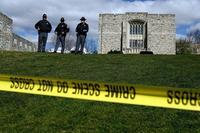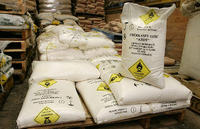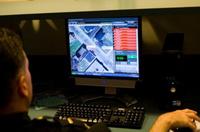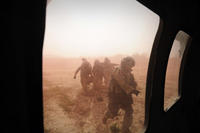-
FBI completes new information sharing system
Late last month the FBI completed work on its newest information sharing database that will allow local, state, regional, and other law enforcement agencies across the United States to pool information; with the National Data Exchange (N-Dex), local investigators can now pull up records like incident reports, criminal incarceration records, and similar investigations from across the United States
-
-
Industry: government hampering efforts to fight counterfeit chips

Representatives from the semiconductor industry said that new Treasury Department and U.S. Customs and Border Protection (CBP) policies have made it difficult to assist the Pentagon in its struggle to keep counterfeit computer components out of its supply chain; Brian Toohey, the president of the Semiconductor Industry Association, a lobbying group, said that new policies introduced in 2008 by the Treasury Department and CBP have made it difficult for manufacturers to identify counterfeit products
-
-
New desalination technology to help solve world's water shortage

Over one-third of the world’s population already lives in areas struggling to keep up with the demand for fresh water. By 2025, that number will nearly double; a new study argues that seawater desalination should play an important role in helping combat worldwide fresh water shortages once conservation, reuse, and other methods have been exhausted
-
-
Man purchases FBI, CIA, and Chicago police badges online
Last month a man was arrested after airport screeners at Chicago’s O’Hare International Airport found a Chicago police badge in his baggage; a search of the man’s apartment revealed that he had obtained more than fifty federal, state, and local law enforcement badges from agencies including the Illinois state police, the FBI, the CIA, and the Cook County Sheriff’s Department.
-
-
Virginia Tech lockdown ends, no gunman found

In an attempt to avoid a repeat of the 2007 mass shooting which left thirty-two people dead, officials at Virginia Tech locked down its campus yesterday after receiving a report of a suspicious man who may have been armed; after an exhaustive search by local police that did not yield any results, authorities decided to lift the lockdown
-
-
Researchers show how to unlock, start a car remotely
Two researchers at the Black Hat event in Las Vegas demonstrated they could send commands from a laptop to unlock the doors of a Subaru Outback — and then start the car; they said that in addition to vehicles, many other GPS-tracking devices, 3G security cameras, urban traffic control systems, SCADA sensors, and home controls and systems are also telephony-enabled and, as a result, susceptible to attack
-
-
Napolitano addresses Public Private Partnership conference
DHS secretary Janet Napolitano spoke to the attendees and reiterated the private sector’s role as an important partner in strengthening the homeland security enterprise better to defend against evolving threats, including disasters
-
-
DHS slow to crack down on ammonium nitrate sales

U.S. lawmakers are becoming frustrated with DHS for its slow implementation of regulations on ammonium nitrate fertilizer, a key ingredient in dangerous homemade explosives like the one used in the deadly 1995 Oklahoma City bombing; Congress initially passed legislation tightening control on the sale of the fertilizer in 2008, but DHS has yet to implement such regulations and three years later is only now publishing a set of “proposed” rule
-
-
Thales’s Liberty LMR completes Department of Interior tests

Thales’s Liberty LMR has passed U.S. Department of Interior tests; the radio had earlier been approved for Law Enforcement and Tiers 1, 2, and 3; the company says the Liberty LMR, a software-defined radio solution, enables interoperability across all public safety bands, linking government agencies and first responders with a single portable radio
-
-
Alliance urges Congress to focus on D block allocation
The Public Safety Alliance (PSA) strongly encourages Congress to stay focused on legislation that would allocate the D Block to public safety for the creation of a nationwide, interoperable first responder broadband network
-
-
Solving cold case by recovering old fingerprints
Researchers are developing a novel method for recovering old fingerprints using gold-antibody nanoparticles; the new fingerprinting method that could make it possible to recover previously unusable or undetected prints from old evidence and from surfaces long considered too difficult by crime scene investigators
-
-
Listening to the sound of bullets

ShotSpotter systems relies on a system of acoustic sensors to identify the location from which a shot has been fired; the alerts are immediately conveyed to police dispatchers, 911 operators, and sometimes to officers in the field via laptops in patrol cars; the system includes a computer program which displays a comprehensive bird’s-eye view of the area, marking the location of the incident with a red dot and indicating the time and number of rounds fired
-
-
Research inspires robotics design for medicine, military
A pathogen that attacks the small intestines of humans and animals is serving as the inspiration for developing robots that can fight disease and aid in military operations; ror 250 years, scientists have tried to understand how the microorganism is able to attach to a multitude of surfaces and swim in harsh environments — enabling it to infect many kinds of species while most parasites have specific hosts
-
-
Blast gauge gives medics, doctors critical information

Researchers are working to enhance the safety of soldiers in the field through the development of a device that monitors the physical impacts of exposure to an explosive blast; 188,270 service members have suffered a traumatic brain injury in the last decade; the extent of injury is often difficult to discern, making diagnosis and selection of appropriate medical treatment challenging
-
-
Foreign sham marriage ring broken up
Last week fourteen people were charged with conspiracy to commit marriage fraud in an attempt to secure citizenship in the United States; the plan involved paying U.S. citizens to enter into false marriages with foreigners from Eastern Europe and Russia to legalize their immigration status; the U.S. recruits were offered as much as $5,000 to participate in the scheme
-
More headlines
The long view
Tantalizing Method to Study Cyberdeterrence
Tantalus is unlike most war games because it is experimental instead of experiential — the immersive game differs by overlapping scientific rigor and quantitative assessment methods with the experimental sciences, and experimental war gaming provides insightful data for real-world cyberattacks.
Using Drone Swarms to Fight Forest Fires
Forest fires are becoming increasingly catastrophic across the world, accelerated by climate change. Researchers are using multiple swarms of drones to tackle natural disasters like forest fires.
Testing Cutting-Edge Counter-Drone Technology
Drones have many positive applications, bad actors can use them for nefarious purposes. Two recent field demonstrations brought government, academia, and industry together to evaluate innovative counter-unmanned aircraft systems.
European Arms Imports Nearly Double, U.S. and French Exports Rise, and Russian Exports Fall Sharply
States in Europe almost doubled their imports of major arms (+94 per cent) between 2014–18 and 2019–23. The United States increased its arms exports by 17 per cent between 2014–18 and 2019–23, while Russia’s arms exports halved. Russia was for the first time the third largest arms exporter, falling just behind France.
How Climate Change Will Affect Conflict and U.S. Military Operations
“People talk about climate change as a threat multiplier,” said Karen Sudkamp, an associate director of the Infrastructure, Immigration, and Security Operations Program within the RAND Homeland Security Research Division. “But at what point do we need to start talking about the threat multiplier actually becoming a significant threat all its own?”
The Tech Apocalypse Panic is Driven by AI Boosters, Military Tacticians, and Movies
From popular films like a War Games or The Terminator to a U.S. State Department-commissioned report on the security risk of weaponized AI, there has been a tremendous amount of hand wringing and nervousness about how so-called artificial intelligence might end up destroying the world. There is one easy way to avoid a lot of this and prevent a self-inflicted doomsday: don’t give computers the capability to launch devastating weapons.
